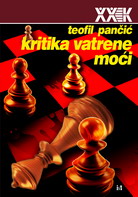CRITIQUE OF FIREPOWER: Life and death in Serbian post-Communism
2013, 334 pages
Price: 750 dinars
Teofil Pančić wa born in Skoplje in 1965. He is a columnist and literary critic for the magazine Vreme. He publishes texts in several different genres in publications throughout the former Yugoslavia. He lives in Zemun and Novi Sad. Aside from this one, he has published the following books: Urban Bushmen (Biblioteka XX vek, 2001), Keepers of the Bengal Fire (Biblioteka XX vek, 2004), Unusual Signs (Beopolis, 2006), On Party-paper Business (Dnevnik, 2006), The Famous 400 Kilometres (VBZ, 2007), Karmacoma (Biblioteka XX vek, 2007), Through the Cliffs (Biblioteka XX vek, 2007), A Sandbar of Sand (Peščanik, 2008), Ashes Without a Garden (Dnevnik, 2008), Carmen Seeks a Window (Rende, 2009), Refitting the Time Machine (Biblioteka XX vek, 2010), The Foolish Chanteuse (Dvevnik, 2010), The Blonde’s Dilemma (Cenzura, 2011), The Station of Phantom Trains (KCNS, 2011), The Arrest of Buba Erdeljan (Čarobna knjiga, 2013), The Alley of Viktor Bubanj (Naklada Ljevak and SNV, 2013), and Rhinoceroses With Hats (Karpos, 2013).
Introduction
CHRONICLE OF A DEATH FORETOLD: THE “REPUBLIC OF 5th OCTOBER”
Something old died slowly without ever maturing, and nothing new was on the horizon and probably will not be for the foreseeable future; in that constellation of events, on the horizon appeared (it could be said without exaggeration, like a vampire) something older than old, and it tried to present itself as something completely new and completely good – even more, as something we have always been waiting for. But probably we did not know that we were waiting for just that, and that it would look just like that. It is disconcerting to see how much people believed in that, and even more who believed in it…
Critique of Firepower principally tries to “capture” the moment at which things had not completely come together (or come apart) in that direction, but they were clearly rushing that way. In that regard it probably makes sense to regard this book as the last in the series I have called “Life and death in Serbian post-Communism.” Why the last? Because one epochal circle has been closed. Urban Bushmen followed the “proud stumble” across the 1990s and the slow, painful birth of the “October 5 Revolution,” as the first twelve year of the 21st century in Serbia might be called. The following books Keepers of the Bengal Fire, Through the Cliffs and Refitting the Time Machine (also Karmacoma, as a stand-alone “project”) chronicle the various meanderings of that revolutionary order, which was undertaken with more hope than reason, power or, especially, moral or any other kind of constancy. This book traces, by looking at the three-year period from 2010 to 2012, something that could be called without exaggeration the death and departure of the “Republic of 5th October.” This republic begins its life on the basis of a (declarative) break and discontinuity with the Serbian 1990s, and, it is understood, with the period that preceded. And it ends with the resurrection of the people we remember from our dark(est) past, as its creators and enablers, to come to power again ostensibly to do us the favour of lifting us out of that very past.
With that, a new era has arrived. My job remains to announce its arrival and to trace its development. It will definitely not be dull, and you will have more to read – if we have the chance.
Teofil Pančić
September 2013




